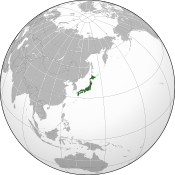Power outage at Fukushima poses radioactive risk
Friday, April 24, 2015
A power outage at Japan's Fukushima 1 nuclear plant on Tuesday has seen eight water transfer pumps shut down, hindering efforts to collect leaked radioactive water before it can reach the sea.
Tokyo Electric Power Company (TEPCO), which runs the plant, said the affected pumps pull radioactive water out of a drainage channel, sending it through another channel to an enclosed artificial bay. This transfer began on April 17, following an official report released in February by TEPCO, revealing high concentration of radioactive materials found in the plant's drainage water.
This latest news from the nuclear plant, which sits on the eastern edge of the island nation, alongside the North Pacific Ocean, comes four years after the Fukushima Daiichi nuclear disaster, on March 12, 2011. This disaster saw the nuclear plant subjected to the combined force of an earthquake and tsunami, which caused an explosion at the plant. Since then, the site has remained unstable.
The Woods Hole Oceanographic Institution found small amounts of radioactive caesium isotopes along the coast of North America, reported early this month. Along with these caesium substances, TEPCO reports indicate up to 10 trillion becquerels of strontium-90 and 40 trillion becquerels of tritium have contaminated sea water as a result of, and in the aftermath of, the 2011 disaster.
Related news
- "Explosion at earthquake-damaged Fukushima nuclear power plant" — Wikinews, March 12, 2011
Sources
- "Pumps at Fukushima plant halted, toxic water leaking into ocean - TEPCO" — RT (TV network), April 21, 2015
- "Outage hits pumps at Fukushima plant; toxic water leaks into ocean" — The Japan Times, April 21, 2015
- Tracy Loew. "Fukushima radiation has reached North American shores" — Statesman Journal, April 6, 2015
- "100 tons of toxic water leaked at Fukushima plant" — RT (TV network), February 20, 2014
- Ian Sample and Tania Branigan. "Fukushima nuclear plant blast puts Japan on high alert" — The Guardian, March 12, 2011

